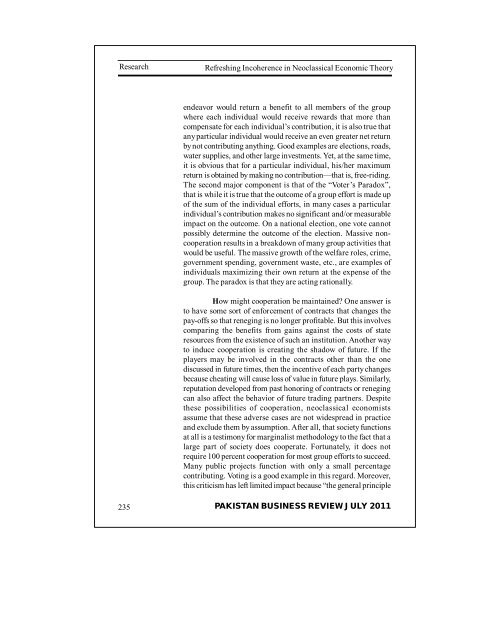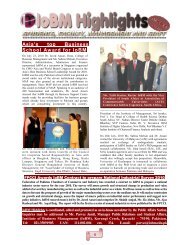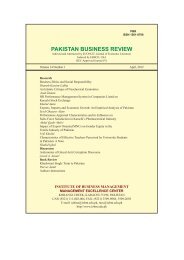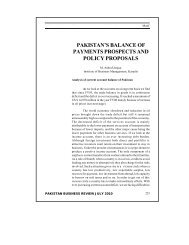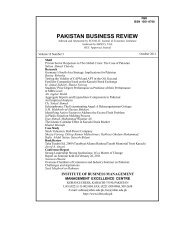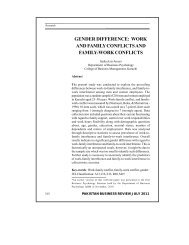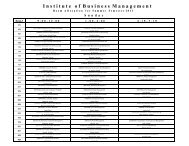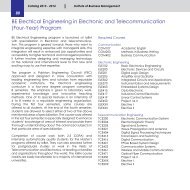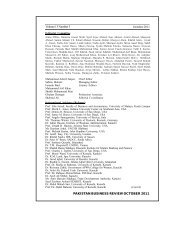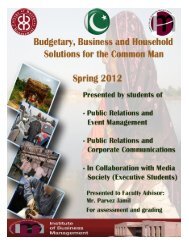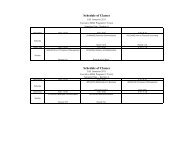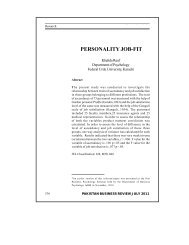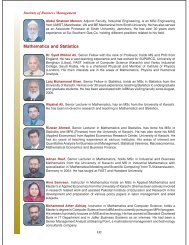PAKISTAN BUSINESS REVIEW - Institute of Business Management
PAKISTAN BUSINESS REVIEW - Institute of Business Management
PAKISTAN BUSINESS REVIEW - Institute of Business Management
You also want an ePaper? Increase the reach of your titles
YUMPU automatically turns print PDFs into web optimized ePapers that Google loves.
Research<br />
Refreshing Incoherence in Neoclassical Economic Theory<br />
endeavor would return a benefit to all members <strong>of</strong> the group<br />
where each individual would receive rewards that more than<br />
compensate for each individual’s contribution, it is also true that<br />
any particular individual would receive an even greater net return<br />
by not contributing anything. Good examples are elections, roads,<br />
water supplies, and other large investments. Yet, at the same time,<br />
it is obvious that for a particular individual, his/her maximum<br />
return is obtained by making no contribution—that is, free-riding.<br />
The second major component is that <strong>of</strong> the “Voter’s Paradox”,<br />
that is while it is true that the outcome <strong>of</strong> a group effort is made up<br />
<strong>of</strong> the sum <strong>of</strong> the individual efforts, in many cases a particular<br />
individual’s contribution makes no significant and/or measurable<br />
impact on the outcome. On a national election, one vote cannot<br />
possibly determine the outcome <strong>of</strong> the election. Massive noncooperation<br />
results in a breakdown <strong>of</strong> many group activities that<br />
would be useful. The massive growth <strong>of</strong> the welfare roles, crime,<br />
government spending, government waste, etc., are examples <strong>of</strong><br />
individuals maximizing their own return at the expense <strong>of</strong> the<br />
group. The paradox is that they are acting rationally.<br />
How might cooperation be maintained? One answer is<br />
to have some sort <strong>of</strong> enforcement <strong>of</strong> contracts that changes the<br />
pay-<strong>of</strong>fs so that reneging is no longer pr<strong>of</strong>itable. But this involves<br />
comparing the benefits from gains against the costs <strong>of</strong> state<br />
resources from the existence <strong>of</strong> such an institution. Another way<br />
to induce cooperation is creating the shadow <strong>of</strong> future. If the<br />
players may be involved in the contracts other than the one<br />
discussed in future times, then the incentive <strong>of</strong> each party changes<br />
because cheating will cause loss <strong>of</strong> value in future plays. Similarly,<br />
reputation developed from past honoring <strong>of</strong> contracts or reneging<br />
can also affect the behavior <strong>of</strong> future trading partners. Despite<br />
these possibilities <strong>of</strong> cooperation, neoclassical economists<br />
assume that these adverse cases are not widespread in practice<br />
and exclude them by assumption. After all, that society functions<br />
at all is a testimony for marginalist methodology to the fact that a<br />
large part <strong>of</strong> society does cooperate. Fortunately, it does not<br />
require 100 percent cooperation for most group efforts to succeed.<br />
Many public projects function with only a small percentage<br />
contributing. Voting is a good example in this regard. Moreover,<br />
this criticism has left limited impact because “the general principle<br />
235<br />
<strong>PAKISTAN</strong> <strong>BUSINESS</strong> <strong>REVIEW</strong> JULY 2011


